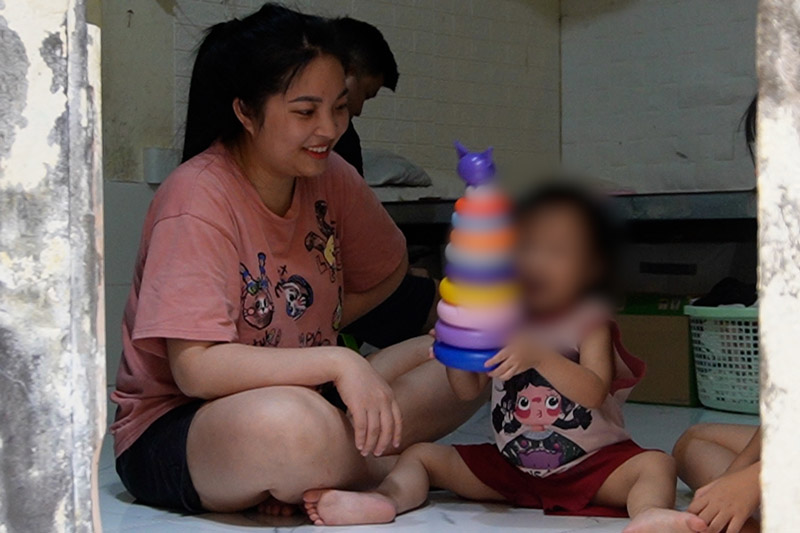Having left her hometown to work as a worker in Bac Thang Long Industrial Park (Dong Anh, Hanoi) for more than 10 years, that was also the time when Ms. Vu Thi Cuc had to leave her child in her hometown to be taken care of by her grandparents.
The rotating work schedule, working day and night shifts, day and day shifts, makes Ms. Cuc almost unable to have time to directly care for and raise her children.
According to Ms. Cuc, the thing that makes her most determined is not being with her children often. Taking advantage of this year's summer vacation, Ms. Cuc took her child to Hanoi to be close to her parents, but because she was busy with work and the boarding house lacked space for entertainment, her child could only be friends by phone.
"I hope to have a stable job, work during office hours to have time to take care of my children. Currently, it is very difficult to think about welcoming a child to a higher place, because even I myself have not been able to take care of enough food and living.
This time, my child has been living with his parents for a week but still hasn't been able to go anywhere, and today he has to go back to his hometown because both husband and wife are working, 12 - 13 hours a day," said Ms. Cuc.
Not only Ms. Cuc, many workers in Bac Thang Long Industrial Park are also worried about a place to play for their children every summer.
Talking to reporters, Ms. Tran Thi Thu Hue said that when her children entered the summer vacation, she sent her 3 children back to their hometown so that they could have more space to play. Currently, if they stay in Hanoi, her 3 children can only move around a rented room of about 20 square meters. Without TV, no phones, the children just play toys together, making it difficult to experience.
Ms. Hue said: "In the summer, my family only let my children go out for a short time in the inner city and then took them back to their hometown to reduce costs. When returning to the countryside, the children have more activities: Playing with friends, grazing buffalo blankets, running in the fields, the space is also more spacious, airy, and less crowded than in Hanoi".
The small salary combined with many expenses makes letting children go out in the inner city or shopping malls a luxury problem for many workers. Currently, there are 2 children, an 8-year-old child and a 4-year-old child, but only occasionally can Ms. Duong Thi Linh take her child to the center of Hanoi to play. Ms. Linh understands that her children also suffer many disadvantages, but because of their difficult lives and having to save money, Ms. Linh does not know what to do.

"In the summer, I grew up taking care of my children and playing with toys. Otherwise, the children were at home watching phones, TV or parents were on duty at night to play with them for a while. I really hope to have more playgrounds in the workers' area so that my children can exercise and play comfortably in the summer and after stressful school hours," Ms. Linh confided.
Building safe and healthy playgrounds for workers' children is not only a practical need but also a long-term solution in caring for the spiritual life of workers. For young children, playgrounds are not only a place for entertainment but also an environment for movement, communication, development of social skills and personality formation.

According to workers, having fun properly will help them have a full summer, away from electronic devices and potential risks from lack of living space. In addition, when children are cared for and play in a safe environment, they will feel secure at work, reduce mental pressure and be more attached to work and the place of residence.
Therefore, investing in building playgrounds in workers' areas is not only about caring for future generations, but also an investment in the stability and sustainable development of the workforce.









